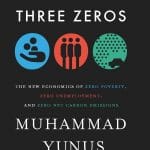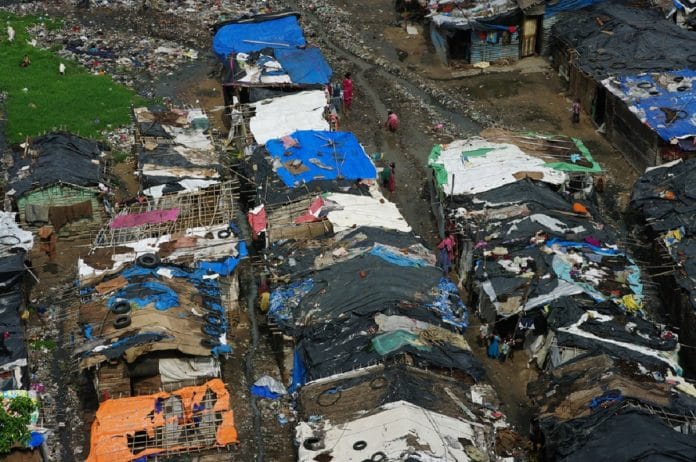There might be differences of opinion regarding the internal functioning and structures of microfinance institution but it is hard to deny its positive impact in reducing poverty.
The book- ‘A World of Three Zeros’ is largely an account of the success stories of the experimental projects initiated by Muhammad Yunus in the fields of microcredit and social business. The author argues that an expansion of the projects in the stated fields can be a basis to transform the world in order to make it free from the most challenging problems- poverty, unemployment and carbon emission. According to the author, the genesis of these problems can be attributed to the economic system that we are in and the motive forces that drive the functioning of the system. More specifically, the assumption that the economic agents are self-regarding forms the basis of neoclassical economics and is primarily responsible for viewing an entrepreneur to have an outlook that is exclusively concerned with profit maximization. This is regarded as a necessary condition for wealth concentration.
The book provides relevant data and information to show that the income inequality, a logical fallout of wealth concentration, poses a threat to democracy and therefore emerges as a big challenge to the world. However, the idea that the entrepreneur is only endowed with the value of self-centeredness as propounded by the tenets of neoclassical economics has limitations. Since the theory is built on the observation of agents behaving in accordance with the animal spirit of profit maximization notwithstanding the fact that not all the agents behave alike, the assumption therefore emerges from the practical observations and is incorporated in the models of agent’s behaviour. It, thus, seems that the prevailing value system of a society shaped by the existing economic system is more likely to be at the core of such behaviour. A world free from wealth inequality, therefore, necessarily demands an economic system that discourages self-regarding values and promotes the qualities of a ‘real man’ – selflessness, compassion and care, which the capitalist system fails to offer.
While recognizing the fact that the capitalist system has inherent tendency to generate such undesirable outcomes- income inequality, unemployment and poverty, the book unfortunately has not been able to outline the mechanisms through which these outcomes materialize. That lack of understanding of the system seems to propel the author to give an impression that free market does not have an unfavorable impact on employment and level of poverty and the capitalists by nature do not contribute adversely. If one views capitalism as a system functions on the basis of surplus extraction and the drivers of the system are the big corporate, such claims immediately stand vacuous. The 2010 and 2017 Oxfam reports the author himself has quoted on inequality confirms this proposition. Moreover, the penetration of big corporates owing to free market has the potential to replace the small business and therefore can accentuate the problem of poverty and unemployment.
Since the incidence of unemployment and poverty is interlinked, the book clearly advocates a system that produces more job creators than job seekers. The 2008 financial crisis has pressed for such a need to address the issue of unemployment and poverty.
It is evident that high inequality inhibits the process of employment generation as the economic system generates insufficient effective demand and allows only a few to take up new investment projects. The rest despite having the quality and the potential of becoming an entrepreneur cannot execute their projects due to lack of access to finance. In most of the developing countries the financial system is not only limited in its operation but also does not lend to the poor on the pretext of lack of credit worthiness. The author in this book thus vouches for a revamp in the financial system following his success in advancing micro credit through Grameen Bank in Bangladesh. Grameen Bank is designed to disburse credit to the poorer section of the population who otherwise do not have access to credit through formal banking system. The provision of micro credit, as the author shows with relevant data and information, has been able to resolve many local problems confronting the poor like- drinking water, sanitation, health, education, among others. Provision of micro credit which runs on trust of the people, therefore, provides an alternative against the formal banking system that mostly favours the rich. The interest rate charged for the credit is although lower than that of banking system but it is as high as 20 percent with a whopping profit every year (Tk 139.29 crore in 2016).
Today, many countries all over the world have adopted the microfinance as an additional financial channel to advance credit to the targeted group. This book provides a detailed discussion on the projects related to micro finance taken up by different countries. While discussing the success stories of micro finance the author tends to suggest that the government should not take part in the provision of micro credit as it might not be able to ensure high repayment due to its political allegiance and NGO working on micro credit should be given license to function and collect deposit from the people for lending. However, implementation of such suggestions is open to questions on two obvious counts. Firstly, absence of government involvement in credit disbursement may delimit the success and the coverage of the micro finance with no control over interest rate charged by the institutions. Secondly, lack of banking regulation applicable to private micro credit institution may create an environment conducive to fraudulent activities like chit fund.
There might be differences of opinion regarding the internal functioning and structures of microfinance institution but it is hard to deny its positive impact in reducing poverty. Bangladesh is a glaring example of it.
Likewise, the author also suggests social business as a way to deal with unemployment. Social business is based on the principle of zero profit. Investors offer fund to people with a promising project plans that attempt to solve challenging problems. The investors in return do not get any additional profit but simply provide support to the budding entrepreneurs. This way of generating employment on one hand reduces the dependence on the state and the corporate and provides an avenue for nurturing the innate quality of the youth on the other.
However, such investment fund does not necessarily ensure that the newly funded projects remain ascribed to the principle of zero profit. In that case it would again amount to promote the virtues of a capitalist system as against that of social business.
The success of social business projects in Bangladesh has been recognized by many countries which can be seen in their increasing involvement in those projects. Many universities across the world also have included the study of social business in academic course curriculum. The book has provided almost an exhaustive account of such global initiatives.
The book further discusses at length the challenge relating to zero carbon emission. It again shows the huge potential of social business to address this challenge. Carbon emission is largely related to climate change which has caused havoc in many countries including Bangladesh. The author has initiated a number of social business projects to deal with it. One of the projects that indeed has made a difference in Bangladesh is known as ‘Grameen Shakti’ which promotes solar energy as a source of renewable energy to meet the growing energy need. Similar initiatives have been adopted in many countries in succession to address this problem.
By making significant dents on issues relating to poverty, unemployment and carbon the social business projects contributed substantially in fostering Millennium Development Goals (MSDs) and Sustainable Development Goals (SDGs) launched by the United Nations. This, therefore, forms the basis for the author to claim that a better world is possible if Countries come together and promote the virtues of social business. The unprecedented progress of technology in all the fields including information and communication in the last decade has further facilitated this process.
Additionally, a world that aspires to be free from poverty, unemployment and carbon essentially requires a sound legal and financial infrastructure and fruitful implementation of good governance in all countries ensuring fair election and protection of human rights, and, needless to say, prevalence of a value system that cares humanity more than money.
On the whole, the arguments of the author for a better world rest on the attainment of a potent value system based on selflessness and an economic system that produces more job creators than job seekers through social business. It appears that the author has sought for an easy remedy to the everlasting problems- poverty, unemployment and carbon. A world where everybody is bestowed with the value of selflessness, much of these problems do not emerge to begin with. Therefore, it still remains to be a challenge to find a solution in a world that is not ideal in the sense of the value system that the author has in mind. Furthermore, to inculcate a value system of the kind that author talks about requires transcending the framework that only produces entrepreneurs. One needs to acknowledge that the wisdom from all the disciplines including humanities and social sciences have significant role to play in terms of instilling those values. Such knowledge may not always serve the purpose of crafting an entrepreneur. A dream of a better world cannot be realized if we ignore those wisdoms.
 ‘A World of Three Zeros: The New Economics of Zero Poverty, Zero Unemployment, and Zero Net Carbon Emissions by Muhammad Yunus’ has been published by Hachette India.
‘A World of Three Zeros: The New Economics of Zero Poverty, Zero Unemployment, and Zero Net Carbon Emissions by Muhammad Yunus’ has been published by Hachette India.
Dr. Debabrata Pal teaches Economics at Jawaharlal Nehru University, New Delhi. ‘A World of Three Zeros: The New Economics of Zero Poverty, Zero Unemployment, and Zero Net Carbon Emissions by Muhammad Yunus’ has been published by Hachette India.






